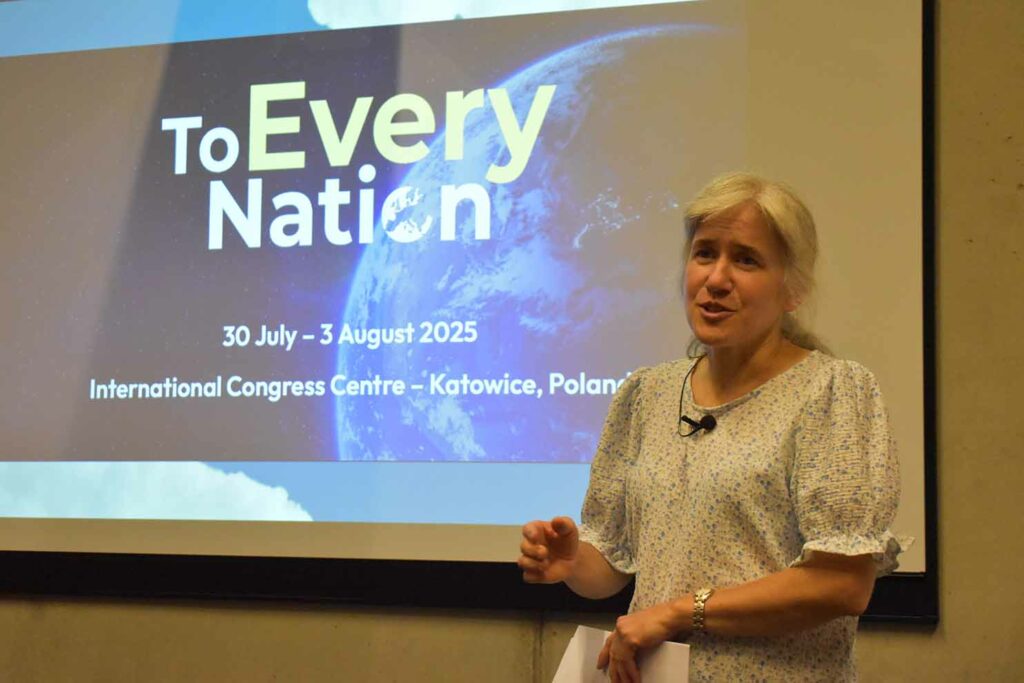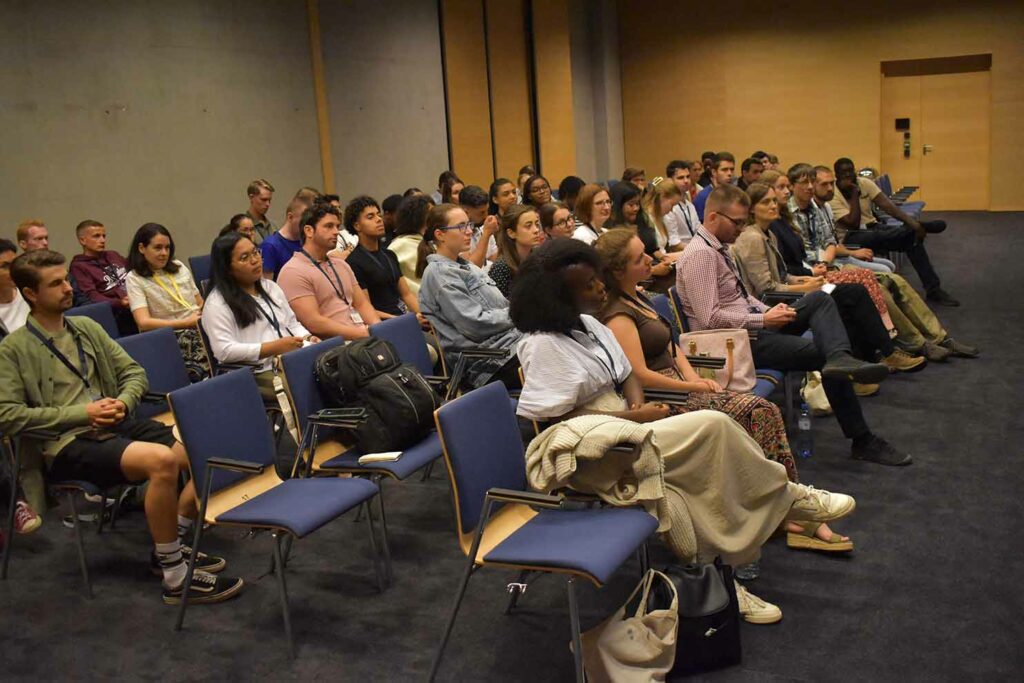Why It Is Important for Adventists to Enjoy Strong Mental Health
Educator discusses current mental challenges and suggests a way forward.
September 16, 2025 | Katowice, Poland | Marcos Paseggi, Adventist Review
When Yvonne Seidel asked her workshop participants at the 2025 Generation. Youth. Christ. (GYC) Europe convention in Katowice, Poland, to raise their hands if they had ever been affected by a mental health challenge or if they knew someone who had been affected by it, almost everyone raised their hands.
“God did not design us to endure mental health issues,” she said at the beginning of her July 31 presentation. “And yet it is one of ways the devil uses to keep us away from God, because mental challenges can distort the picture of who He is and who we are.”
Seidel, a teacher of religious education at Bogenhofen Seminary in Austria, discussed why as Seventh-day Adventists it is important to strengthen our mental health and to do things that are conducive to stronger mental abilities, especially as we approach what Adventists believe is the end of time.

Yvonne Seidel, a teacher of religious education at Bogenhofen Seminary in Austria, discusses how to improve our mental health and why it’s important that we do, during the 2025 Generation. Youth. Christ. Europe convention in Katowice, Poland, July 31. [Photo: Marcos Paseggi, Adventist Review]
Two Overarching Principles
An ideal picture of mental health contains two key elements, Seidel said.
According to the Bible, human beings comprise physical, emotional, and spiritual elements, Seidel reminded workshop attendees. And God calls us to love the Lord with all our hearts—that is to say, with the seat of our thoughts, conscience, and passions; with all our minds, with our understanding, feeling, and desiring; and with all our might, our physical bodies. “In the Bible, thinking and feeling go together, something key when discussing mental health,” she said. Thus, Seidel suggested, mental health combines the intellectual, the social, and the emotional parts of a human being.
At the same time, everything we do is based on a choice we make. “Nothing that we do just happens to us,” Seidel said. Unless I am a little child, “no one can force me to do something.” She explained, “If there’s only one fiber in my being that wants to go in one specific direction, the Lord will provide complete freedom, even if we are caught in addictions . . . and we need to struggle through a process and get external help [to achieve it]. This is the importance of the power of the will, she said, of surrendering our will so God can act on our behalf.Seventh-day Adventists and Mental Health
Against that background, Seidel spent part of her workshop connecting the dots between mental health and its implications for Seventh-day Adventists. “Mental health is a state of mental well-being that enables people to cope with the stresses of life, realize their abilities, learn well and work well, and contribute to their community,” she read from the World Health Organization definition. “Mental health is a human right.”

The 2025 Generation. Youth. Christ. Europe convention attendees follow Yvonne Seidel’s presentation on mental health in Katowice, Poland, July 31. [Photo: Marcos Paseggi, Adventist Review]
For Adventists, a search for optimal mental health implies giving our hearts—surrendering our will—to God, letting Him take charge of every aspect in our lives, knowing that He cares for us and has our best interest in His heart, Seidel explained. “In the end the key question is Have I that kind of relationship with Jesus, that whatever comes to my mind, I can give it to Him?” Seidel asked. In those cases, even if other people make something bad happen to me, it does not affect my mental health, because I can give everything to God, she said.
Asking Questions
In the next part of her presentation, Seidel suggested several questions that can help Adventists to assess and develop the spiritual dimension needed to thrive in their mental health. “How do I relate to God? What and who is He for me? Have I surrendered my life to Him? the good and the bad? my fears and anxieties?” she asked. “Is He in charge of all the issues in my life? Can I cope with life’s difficulties because I can cast all my cares upon Him, knowing that He cares for me?”
At the same time, Seidel suggested other questions that, she said, can help establish a solid foundation for our mental health. “What does God think of me? What do I think of God?” she asked, defining it as a person’s picture of God. She added, “What do I think of myself? Where’s the anchor for my self-worth? What do others think of me? How do I relate to others? In other words, how independent am I of the opinion of others?”The Key to the

For Adventists, a search for optimal mental health implies giving our hearts—surrendering our will—to God, letting Him take charge of every aspect of our lives, Yvonne Seidel, a teacher of religious education at Bogenhofen Seminary in Austria, said. [Photo: Marcos Paseggi, Adventist Review]
At the end of the day, Seidel emphasized, the key is to learn to grow in our relationship to God, giving Him our whole selves so He can work in us, strengthening the power of our will and doing what we cannot do for ourselves.
She closed with a quotation from Ellen G. White’s Steps to Christ: “Let the soul be drawn out and upward, that God may grant us a breath of the heavenly atmosphere. We may keep so near to God that in every unexpected trial our thoughts will turn to Him as naturally as the flower turns to the sun. Keep your wants, your joys, your sorrows, your cares, and your fears before God. You cannot burden Him; you cannot weary Him. He who numbers the hairs of your head is not indifferent to the wants of His children. . . .
“His heart of love is touched by our sorrows and even by our utterances of them. Take to Him everything that perplexes the mind. Nothing is too great for Him to bear, for He holds up worlds, He rules over all the affairs of the universe. Nothing that in any way concerns our peace is too small for Him to notice. There is no chapter in our experience too dark for Him to read; there is no perplexity too difficult for Him to unravel. No calamity can befall the least of His children, no anxiety harass the soul, no joy cheer, no sincere prayer escape the lips, of which our heavenly Father is unobservant, or in which He takes no immediate interest. . . . The relations between God and each soul are as distinct and full as though there were not another soul upon the earth to share His watchcare, not another soul for whom He gave His beloved Son” (pp. 99, 100).